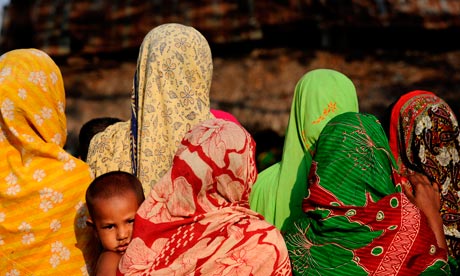
Got a well-read blog about politics or social issues? Do your Twitter followers number in the thousands? Are you relatively clean-living and respectable? If so, the chances are you've crossed the radar of "popmob" (popular mobilisation) staffers in international development campaign organisations. You may already have received an email asking whether you'd consider travelling with them to a developing country, to observe their work on the ground and relay your impressions to your audience. The deal is fairly clear: you get an extraordinary, perception-altering trip for free, and the organisation in question gets to communicate its messages – filtered through your experience – to your readers.
Something along these lines happened to Dooce, aka Heather B Armstrong, a "recovering Mormon" and professional blogger with a huge audience. She travelled to Bangladesh – "slightly smaller than Iowa but with 150 million people" – with Every Mother Counts, a maternal mortality campaign organisation headed up by the former model Christy Turlington. Armstrong reports that her mind is blown: "Right now I'm still trying to make sense of the luxury it is to be able to brush my teeth with tap water without fearing that I might catch a disease that could possibly kill me."
Some observers are uncomfortable about westerners being flown to dirt-poor regions to solemnly observe the impoverished in their natural habitats before returning home with an interesting infection and an exalted sense of enlightenment. Notable among the critics is Bill Easterly, for whom pricking the development aid consensus is both a profession and a hobby. In this post about "poverty tourism", he observes: "The real problem is [the] patronizing attitudes towards [the] beneficiaries – that the poor are helpless victims and it is up to foreigners with superior expertise and funds to rescue them. Condescension … is both offensive AND a sign of a counterproductive approach to development."
Easterly's ire is directed at paying customers; bloggers who make trips for NGOs are usually paid expenses, and perform a quasi-journalistic function. Notwithstanding that, he makes a powerful point. But such trips are not necessarily queasily exploitative; it's all in the handling, and in the outcomes. NGO field workers are well-versed in the niceties of cultural difference and the importance of demonstrating respect (bloggers are firmly discouraged from poking paupers with sticks and asking people to wave their stumps for the cameras). Last year I took a trip with Oxfam's Voice project to New York to report on the millennium development goals summit, and while New York is a long way in every sense from Dhaka, I was struck by the self-criticism of the NGO workers I met. These people want to be effective, and that means finding creative ways to draw in the western public.
Armstrong's accounts so far of her trip to Bangladesh are slightly earnest; but then it is damned difficult to write about the grotesqueries of absolute poverty with any lightness of touch. Developed-country audiences are wearied by descriptions of labouring mothers dying on the backs of motorbikes while being transported hundreds of miles to barely adequate clinics. The preposterous outcomes of global inequality make them uneasy, and they suspect that they are powerless to effect change. NGOs must take some responsibility for this. Throughout the 1980s and 1990s they told their supporters that poverty could be ended by direct debits and wristbands, and they are now reaping the results of an over-simplification that bordered on dishonesty.
The bleak truth is that there is no silver bullet, and NGO engagement with bloggers is part of a broader recognition of this fact. Jason Wojciechowski, co-lead of Voice, talks about the subtlety that is possible in a substantial blogpost: "Bloggers want to understand an issue comprehensively and bring what they've learned to their readers. They want more information, not less, and are not interested in soundbites." The first and hardest task is to persuade an audience to absorb information that is miserable or complex, and often both. The second is to get them to act on it. Armstrong's active community page showcases her responsive readers, who are the real target for Turlington. A blogger who has the trust, respect and friendship of her audience will move people to action more readily than the wiliest professional campaigner.
Where blogger engagement projects often fall down is in closing the deal: having aroused the empathy of an engaged audience, they fail to provide something potent for people to do next. If you've just read a post about children working 14 hours a day scavenging material from towering heaps of putrefied waste, you probably want to do something more effective than signing a petition or sending an email to your elected representative; but frequently, this is all that's on offer. Engagement, information and a powerful completion strategy allow westerners to stand behind those in absolute poverty: not to attempt to save them, but to recognise our outrageous luck and try to change global systems for the better. Deciding what this completion strategy should be is the hard part. But without an answer, blogging trips risk being little more than groovy PowerPoint slides in the campaign department's next quarterly report.
• Clarification added on 4 July 2011: Heather B Armstrong paid for the trip and all its expenses herself

